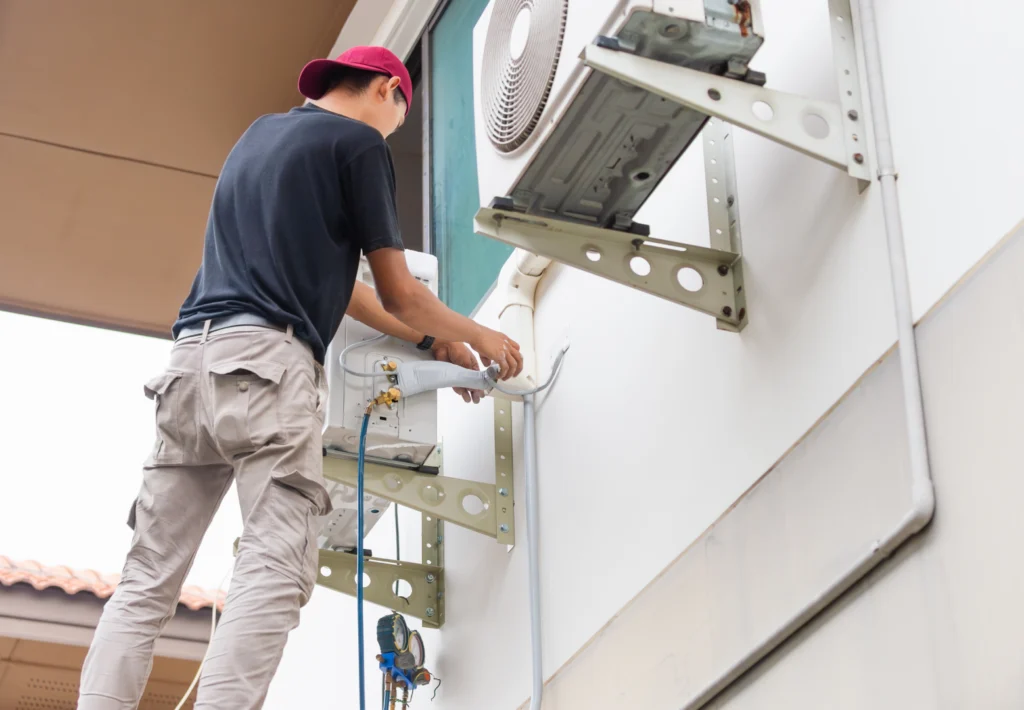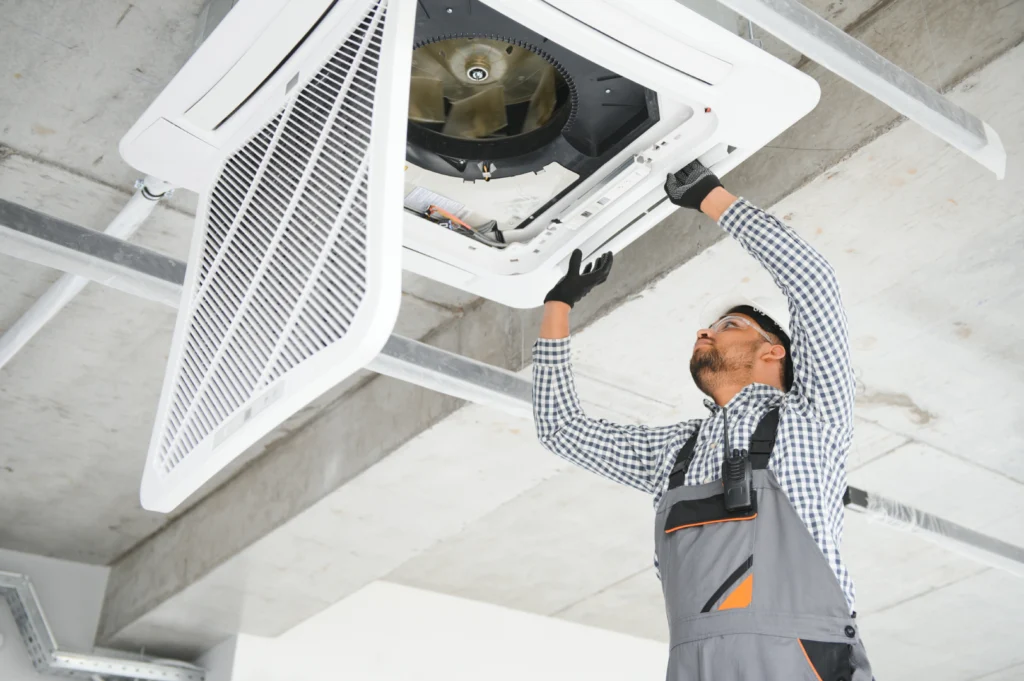
Your HVAC system is no different. It’s the engine of your home’s comfort, and it needs that same regular, proactive care to avoid a breakdown. This isn’t just a clever comparison; it’s the straight truth. Getting a regular HVAC maintenance check is the single best way to keep your family comfortable, your air clean, and your wallet happy.
Your Home’s Engine: Why the Oil Change Analogy Fits Perfectly
Think about what an oil change does. It gets rid of gunk that causes friction. It keeps all the moving parts running smoothly and efficiently. Now, picture your HVAC system. It has a motor, coils that get dirty, and a HVAC filter system that traps dust and allergens.
Over time, that filter gets clogged. The coils get coated in grime. This forces your system to work harder, just like a car engine with old, sludgy oil. That extra strain is what we call preventative HVAC maintenance.
It’s all about stopping the big problems before they ever have a chance to start. You’re not fixing something that’s broken; you’re preventing it from breaking in the first place. It’s the difference between a predictable, small cost and a shocking, enormous one.

The Real Price Tag of Skipping Your Tune-Up
It’s easy to put off that HVAC maintenance schedule. Life gets busy. But let’s be clear about what that procrastination really costs you. A system struggling against a dirty filter or grimy coils is a power hog. It has to run longer to do the same job.
Your next energy bill will tell that story with higher numbers. It’s not just a few dollars, either. A neglected system can see a huge drop in efficiency, sometimes by half! Now imagine it’s the deepest week of winter or the hottest day of summer.
That’s when a strained system finally gives up. You’re left calling for an emergency repair, paying premium rates, and possibly facing a replacement cost you never saw coming. That annual HVAC tune-up service suddenly looks like a fantastic bargain.
Your Secret Weapon for Lower Energy Bills
Who doesn’t want to save money on their gas and electric bills? A well-maintained HVAC system is one of the easiest ways to do it. Think of it like this: a clean system is an efficient system. When the HVAC filter system is new and the coils are clean, air flows freely.
The motor doesn’t have to fight against anything. It can do its job quickly and then shut off. A dirty system, on the other hand, is like trying to run a race while breathing through a straw.
It’s exhausting and inefficient. Keeping up with regular HVAC maintenance is the key to unlocking those energy efficient HVAC systems you hear about. The efficiency is built in; maintenance just unlocks it.
Squeeze Every Last Year Out of Your System
You made a big investment when you bought your furnace and air conditioner. Regular HVAC maintenance is how you protect that investment and make it last as long as possible. We’re not just talking about a year or two.
A cared-for system can outlive a neglected one by a full decade or more. That’s years of avoiding a five-figure replacement cost. This happens because a technician catches the small stuff during an annual HVAC service.
A little wire is loose. A component is starting to wear out. These tiny fixes prevent a domino effect that could take out your entire compressor. It’s the ultimate form of home HVAC system protection.
The Air You Breathe Depends on It
This might be the most important reason of all. Your HVAC filter system is your lungs. Every bit of air you breathe inside passes through it. Its job is to catch dust, pollen, pet dander, and mold spores. But a filter that’s clogged and dirty can’t do its job.
Those pollutants get blown right back into your living room, your bedroom, your kids’ playroom. For anyone with allergies or asthma, this is a big deal. Simply sticking to a routine HVAC filter replacement is one of the simplest, most effective ways to improve indoor air quality in your entire home.
What You Can Do (And What a Pro Should Do)
The good news is, you don’t have to do it all yourself. HVAC care is a team effort.
Your To-Do List (The Homeowner’s HVAC Maintenance Checklist):
- HVAC filter replacement:
This is your number one job. Check it every month. If it looks dirty, change it. Don’t wait. This is the easiest way to keep your system healthy.
- Clear the area:
Go outside and look at your AC unit. Make sure there’s at least two feet of clear space all around it. No bushes, no piles of leaves, no stored items blocking the airflow.
- Listen and feel: Pay attention.
Do you hear a new rattling noise? Does the air from the vent feel weak? These are clues that it’s time to call for a routine HVAC inspection.
What the Experts Handle (The Professional HVAC Tune-Up Service):
This is where a trained tech comes in. Their HVAC maintenance checklist is more complex:
- They clean the indoor and outdoor coils you can’t reach.
- They check refrigerant levels and look for leaks.
- They inspect electrical connections for safety.
- They clean the drain line so it doesn’t back up and cause a leak.
- They test the system to make sure it’s running safely and efficiently.
This one-two punch of your basic care and their expert HVAC system checkup is what home heating and cooling upkeep is all about.
Making Maintenance a No-Brainer Habit
The hardest part is remembering to do it. The simplest solution? Tie it to the seasons. Schedule your AC and furnace maintenance in the spring, before you need the AC. Schedule your furnace check in the fall, before you need the heat.
This seasonal HVAC maintenance rhythm ensures your system is always ready for the work ahead. Many companies offer a maintenance plan that does the remembering for you. They’ll call you to schedule, which takes all the mental effort off your plate.
Conclusion:
Here’s something many people discover too late: your manufacturer’s warranty probably requires proof of annual HVAC service. If your compressor fails and you can’t show receipts for professional tune-ups, that warranty claim will likely be denied. Protecting your warranty is a powerful, financial reason to stick to that HVAC maintenance schedule.
Frequently Asked Questions
How often should I change my HVAC filter?
For standard 1-inch filters, every 1-3 months. With pets or allergies, change it every month. Thicker 4-inch filters can often last 6-12 months.
What does a professional HVAC tune-up include?
A thorough tune-up includes cleaning coils, checking refrigerant, testing electrical components, lubricating moving parts, cleaning the drain line, and a full safety inspection.
Is DIY HVAC maintenance a good idea?
You can absolutely change your filter and clear debris. But for anything involving electrical components, gas, or refrigerant, you must call a professional. It’s dangerous and could void your warranty.
How much does a maintenance service call cost?
Typically between $75 and $200. Compare that to the cost of a new compressor ($2,000+) or a full system replacement ($5,000-$15,000+), and it’s incredible peace of mind.
Will maintenance actually lower my bills?
Yes. A clean system runs shorter cycles and uses less energy. You will see the difference on your monthly utility statements.
How does this improve my air quality?
A clean system doesn’t recirculate dust and allergens. Replacing a dirty filter immediately stops those particles from blowing through your house.
What are the signs my system needs service?
Listen for strange noises. Look for weak airflow or water leaks around the unit. Notice if it’s constantly running or struggling to reach the temperature you set.
Are seasonal maintenance plans worth it?
For most homeowners, yes. They automate the process, often come with discounts, and ensure you get priority scheduling if you ever have an emergency repair.
What’s the worst that can happen if I never service it?
The system will slowly lose efficiency and then fail completely, usually at the most inconvenient time possible. You’ll face repair or replacement costs that could have been avoided.
Does this help the environment?
Absolutely. An efficient system uses less electricity or natural gas, reducing your home’s carbon footprint. It also prevents harmful refrigerant from leaking into the atmosphere.